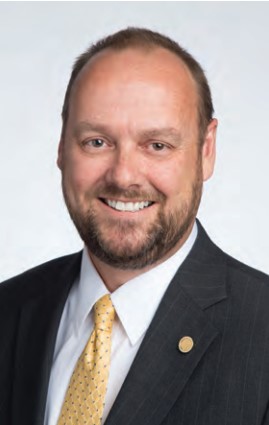Leavitt announces budget cuts amid dropping student retention

Chancellor Leavitt
February 8, 2023
UW Oshkosh Chancellor Andrew Leavitt announced the need to control spending and increase revenue Jan. 31, citing lower student retention, inflation and the school’s tuition freeze as areas of issue.
Leavitt’s announcement stated the need to “slow down the implementation of some of the special initiatives that were approved last year.”
The announcement did not supply any possible course-correcting routes, including which initiatives may be affected, and the chancellor’s office has chosen not to provide any additional comments until a follow-up announcement is released later this month.
Many faculty members have decided to abstain from commenting until more specific course corrections are announced. But some concerns have been voiced over how departments could be affected.
One concern is that some departments will be forced to cut class sections, meaning that fewer scheduling options will be available for students each semester. This could impact students’ ability to graduate on time.
Departments could also be forced to combine with other departments, which could jeopardize job positions that are no longer needed. Still, until more information is released, it isn’t clear what will be done to correct the budget.
Faculty Senate President Jennifer Szydlik said that she has not heard any concerns from faculty. She also said that certain things mentioned in the announcement, such as lacking state support and the tuition freeze, have impacted the budget.
“I think that decades of dwindling financial support from the state coupled with the long-standing tuition freeze has kept the UW System under austerity for as long as many of us can recall,” she said. “We are a bit numb.”
Cindy Schultz, the academic department associate within the journalism department, said that Leavitt’s announcement didn’t provide a lot of information and has left some faculty in limbo.
“Basically, [it said to] tighten your belts with more information to come,” she said. “Right now, it feels like we are just waiting for that other shoe to drop.”
Another area of concern is cuts to department expenditures such as travel money for conferences, which is a crucial element for professors looking to become tenured. Schultz said that similar expenditure cuts have hindered the journalism department.
“The department has been making visits to area high schools in an effort to show students the various careers they can find with a degree from our program,” she said. “However, there are no resources for our departments to cover any costs associated with these visits, such as paying for mileage and printing and duplicating handouts.”
Tim Gleason, the chair of the journalism department, said that there are too many possibilities that could happen and that, until more information is released, nothing can be said for certain.
“At this point, we’re just waiting to hear the details,” he said. “You can’t make any adjustments until you know what types of changes are required, whether it’s a reduction in our budget or a reduction in our teaching loads. We’re waiting to find out what happens, and then we’ll do what we have to do to help the university.”
The announcement mentioned that low student recruitment and retention were factors in the budget correction. Retention rates dropped to a 40-year low among first-year students in Fall 2021, due largely to the COVID-19 pandemic. The announcement states that the university budget was prepared for a 5% decrease in enrollment, but enrollment decreased by 8%.
As a representative of the school faculty, Szydlik said that she is committed to student recruitment and retention.
“We have hired a new staff called Navigators, whose job it is to provide assistance to students who are struggling by connecting them to academic support, counseling, financial assistance, or whatever they need,” she said.
Szydlik said that many faculty and academic staff have participated in workshops focused on supporting students, and instructors have worked hard to build supportive classrooms.
“Still, the pandemic was tough on all of us, and mental health challenges and gaps in learning are apparent,” she said. “That, together with a really strong job market, makes recruitment and retention of students difficult for universities at this time.”
Provost John Koker said that he will be in discussion with university leaders and governance over the coming weeks. If further action is needed, he said that it will be announced toward the end of February.














